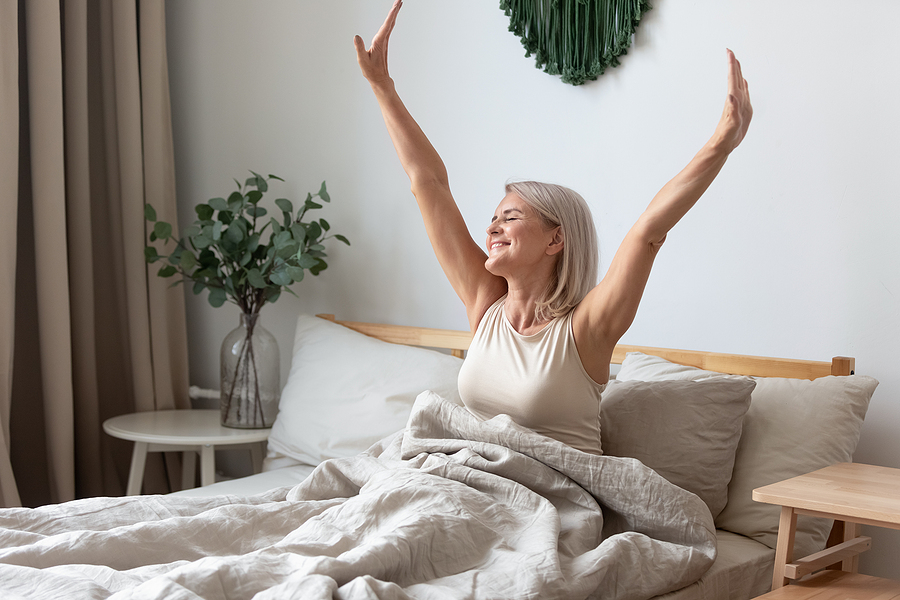Wake up: how to say goodbye to tiredness and fatigue
Even if you sleep well, fatigue can stay with you throughout the day for many reasons. What can you do to address the problems?
You went to bed at a reasonable time and had a peaceful night’s sleep, but at lunchtime, fatigue strikes; how can this be? What are the good habits that can help ensure you don’t feel tired? It can be frustrating to have to live in a constant loop of tiredness for seemingly no reason, and fatigue can become more pronounced with age for a number of reasons. But, don’t worry; there are steps you can take to get your zest for life back!
Fatigue as you age
What can you do to help with reducing tiredness and fatigue? Look at your daily habits.
- Start with your diet. Certain vitamins and minerals help to reduce tiredness and fatigue these include Vitamin B2, B6, B12, C and Iron. Examples of foods containing Vitamin B2 include eggs, lamb, mushrooms. Vitamin B6 can be found in foods such as wholegrain cereals, poultry, pistachios, Vitamin B12 in eggs, milk, cheese, fish, Vitamin C in tomatoes, peppers, broccoli and Iron in lentils, tofu, fortified cereals and, red meat. Additionally, you can also try nutritional supplements containing these nutrients.
- Do you eat too late? Bring dinner forward an hour
- Try not to eat a big meal late at night
- Don’t miss out on going out with friends, have a lunch instead.
Do you make excuses for not doing exercise to make you feel physically tired?
- Exercise doesn’t mean the gym, it could be as simple as a short walk around the block
- Everyday activities such as making the bed, taking out the bins, keeps you moving and helps your body to feel more tired so you are ready for sleep.
What makes for a good night’s sleep?
As you get older not only may you get into habits that affect your sleep, you may also experience a change in your sleeping patterns. For example,
- Several brief awakenings in the night
- A loss of deepest levels of non-REM sleep
- You may nap more in the daytime
Sleep is an important activity to ensure a healthy life and there are several ways you can achieve a good night’s sleep. The Sleep Council have outlined 7 steps for a better night’s sleep:
- Your bedroom – ensure it is a clean, peaceful and welcoming room
- Your bed – it is important to have a comfortable bed that supports your posture and allows you to have a restful sleep
- Your lifestyle – maintain a regular bedtime routine and sleep pattern alongside other changes such as not using technology i.e. mobile phones before bedtime.
- Stress and worry – there is a direct link between anxiety and rhythm of sleep therefore it is important to address your anxieties and worries
- Diet – eating too close to your bedtime can impact upon your quality of sleep
- Exercise – Working out effectively can tire your body out gently, promoting a better night’s sleep. In addition, releasing pent up tension through exercise is also highly beneficial, helping to banish stress before bedtime.
- Relaxation and other therapies – help to promote deep, restful sleep by relaxing your body.
Remember, if you have been feeling unusually tired for a prolonged period it’s worth talking to your GP as a blood test can help to rule out any possible physical reasons for your prolonged tiredness such as anaemia and an underactive thyroid.
Top tips:
- It is important to eat a healthy balanced diet to ensure an adequate intake of nutrients. Nutrients of particular importance for fatigue are Iron, Vitamins B2, B6 & B12 and Vitamin C
- Being the correct weight helps to ensure a healthy body. For example, having adequate muscle strength will allow you to maintain everyday activities
- Anxiety can make you feel more tired. Try to identify what is causing your anxiety so that you can try to address it
- Guidelines state that to keep health risks from alcohol to a low level it is safest not to drink more than 14 units a week on a regular basis. If you wish to cut down the amount you drink, a good way to help achieve this is to have several drink-free days a week
- Try to eat little and often to beat tiredness – a good way to keep up your energy through the day is to eat regular meals and healthy snacks every three to four hours, rather than a large meal less often
- Although you might feel too tired to exercise, regular exercise may be beneficial. Even a single 15-minute walk can give you an energy boost, and the benefits increase with more frequent physical activity
Please note that before making any changes to your diet, supplement or exercise routine, you should always consult your doctor/nutritionist/pharmacist first.




















